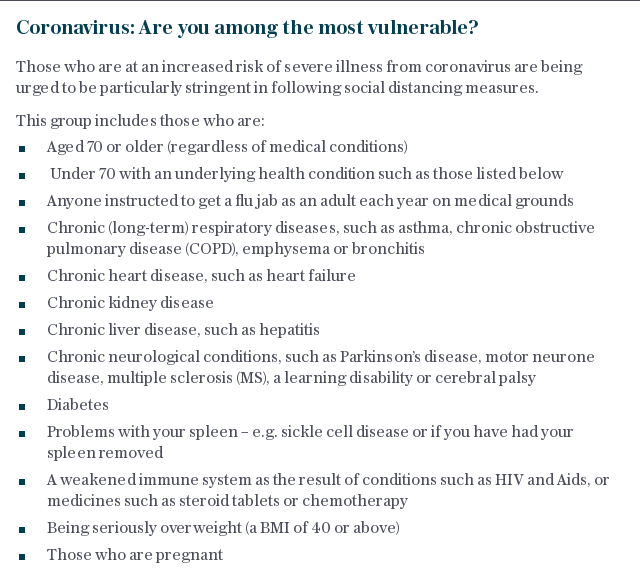Thousands of shielding workers to be forced out of jobs if furlough scheme is not extended

Thousands of workers, including older people and those with health conditions, may be forced out of their jobs when restrictions on those who are shielding for coronavirus begin to lift on August 1.
From this point their employer is able to ask them to return to work, even though they continue to face a high risk from Covid-19 and a large proportion of employers have still not put in place measures to protect those returning to work.
This could force thousands of vulnerable workers to quit their jobs because they do not feel safe to return, said Frances O’Grady of the Trades Union Congress, a federation of trade unions. “Ministers can’t stand by and let these people lose their jobs and livelihoods. The priority now is making sure people who can’t work through no fault of their own do not lose everything they’ve worked so hard for,” she added.
More than half a million (627,000) workers are considered to be particularly vulnerable to coronavirus and currently having to self-isolate. This includes people receiving cancer treatment, those with severe asthma and those who have had an organ transplant.
A third of this group (209,000 workers) is currently on furlough as they are unable to work from home, according to the Office for National Statistics. From August 1 in England, they will no longer be required to stay at home and may be asked to return to work. Shielding will continue until at least July 31 in Scotland and August 16 in Wales.

All employers with more than five staff are required to produce written risk assessments, showing how they are protecting staff from Covid-19. However research by the TUC revealed that more than a third of people returning to work have not been shown any risk assessment by their employer.
Recent data from Public Health England showing a rise in Covid-19 infections in workplaces suggests that even when risk assessments may have been completed, they are not always being acted on.
The TUC is calling on the Government to extend the furlough scheme so that vulnerable workers are not forced to quit their job or work in unsafe conditions. If local areas reintroduce lockdown restrictions following outbreaks, high-risk workers may once again have to isolate and need support in place to do so without losing their job, it said.
It has been joined in its calls by charities including AgeUK, Carers UK, Kidney Care UK, Macmillan Cancer Support, Diabetes UK, the Alzheimer's Society and others. It is also urging ministers to guarantee flexible working, so that people with health conditions who were able to work flexibly during the crisis can continue doing so.
Chris Greaves is one of the shielders due to return to work on August 1. He is considered at risk as he had a kidney transplant a few years ago.
“I’ve been on furlough since March because of that and am really concerned about going back,” Mr Greaves, 41 from Rutland, said. He works as a maintenance technician in a warehouse and said almost 20 of the permanent staff at his workplace had fallen ill with Covid-19.

“At least they’ll know I’m vulnerable and to stay away from me. There’s also agency staff there who won’t know to do so and whose coronavirus status is unknown. It won’t always be possible to keep a two-metre distance from other people,” he added.
He said he had no choice but to return to work: “if I was having to live off statutory sick pay alone, I’d lose my house.”
Sara Bainbridge of charity Macmillan Cancer Support said: “No one should be forced to choose between protecting their health and making ends meet. The Government must ensure employers are meeting their legal obligations to support people to return to work safely and those who are unable to work safely should be able to continue to access support from the Government’s job retention scheme, whether they have been furloughed before or not.”
Stuart Lewis of Rest Less, a jobs site for the over-50s, said: “The pandemic is creating additional uncertainty for our 1.3 million workers aged over 65. We expect large numbers will be forced into the difficult decision not to return to their jobs because of the health risks.”
A Government spokesman said: “We have provided a generous and wide-ranging package of support for businesses. Our job retention scheme has helped a million employers and protected more than nine million jobs across Britain. We have extended it until October – meaning it will have been open for eight months and will continue to support businesses as the economy reopens and people return to work.”
Another said: “Employers must protect the health and safety of their workers under UK law. We expect them to support vulnerable individuals by helping them to work from home, if possible, or to take steps to minimise contact in the workplace if it isn’t. The safer workplaces guidance sets out clearly the government advice for employers with clinically vulnerable staff.”


